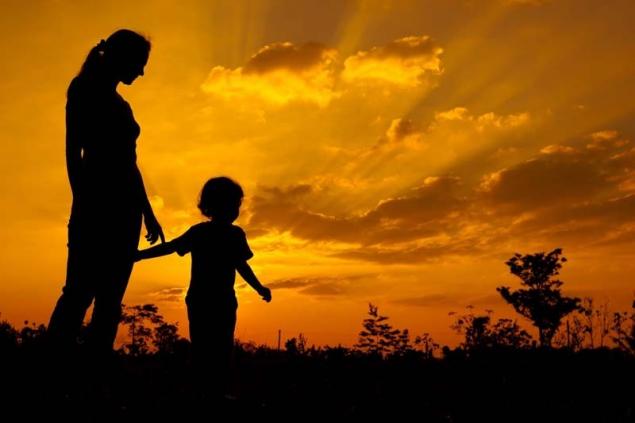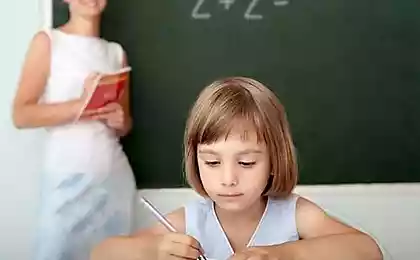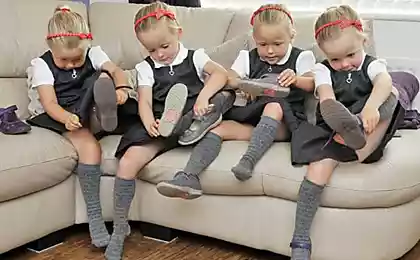467
What can we LEARN from children
The traditional idea of what an adult must do everything for their child and what to teach, he decides, many parents no doubt. When I suggest for a seminar the theme "Children – our teachers," always hear this question: "What and how we can teach children?".
Of course, this is not the training, which are all used. You, as a diligent student, do not sit at their desks to write the algorithms. This training is slimmer, it consists of observations, analysis of the behavior and actions of your beloved children. And most importantly – of your desire to see something that you need to work on yourself. I want to give four qualities that will help you to develop your children.

Love
When I ask the seemingly simple question "what is love?" not everyone can find the answer, but many love mean feeling. When I say that love is an action that most have expressed their doubt. I propose to reflect on the words of Mary the Mantissa: "the child's Mind absorbs everything that happens around openly, watching with love in any way without showing indifference. This love is active and lasting." All adults are ready sincerely with love to do something? Not because I must or I will pay for it, but just out of love?
Trust
In children there are no doubts in correctness of actions of parents when they are somewhere being taken, they trust their mom and dads. We, adults, tend not to trust.
Lack of prejudice: the child will play with a child of a different skin color, nationality or having a disability, not seeing the difference and not attaching much importance, if adults do not emphasize on this.
Forgiveness
If an adult (or older child) offers quarreling children to make peace, they will not stir up the past or to impose conditions before to forgive. All adults do the same?
Willingness to learn
"A little child to know less than an adult and therefore ready to learn." Such willingness to grow, to learn new things available to all, but not all adults want to do it.

In the end, leads to ponder the words of Mary to the Mantissa: "We can always live better because a person has a desire for laziness. The child is just someone who helps an adult to stand up. And if an adult does not make this attempt, the child loses patience, a little embittered, and finally becomes indifferent." published
©Haritina Shadrina
P. S. And remember, only by changing their consumption — together we change the world! ©
Source: mchildren.ru/4-kachestva-kotorym-vas-nauchat-deti/
Of course, this is not the training, which are all used. You, as a diligent student, do not sit at their desks to write the algorithms. This training is slimmer, it consists of observations, analysis of the behavior and actions of your beloved children. And most importantly – of your desire to see something that you need to work on yourself. I want to give four qualities that will help you to develop your children.

Love
When I ask the seemingly simple question "what is love?" not everyone can find the answer, but many love mean feeling. When I say that love is an action that most have expressed their doubt. I propose to reflect on the words of Mary the Mantissa: "the child's Mind absorbs everything that happens around openly, watching with love in any way without showing indifference. This love is active and lasting." All adults are ready sincerely with love to do something? Not because I must or I will pay for it, but just out of love?
Trust
In children there are no doubts in correctness of actions of parents when they are somewhere being taken, they trust their mom and dads. We, adults, tend not to trust.
Lack of prejudice: the child will play with a child of a different skin color, nationality or having a disability, not seeing the difference and not attaching much importance, if adults do not emphasize on this.
Forgiveness
If an adult (or older child) offers quarreling children to make peace, they will not stir up the past or to impose conditions before to forgive. All adults do the same?
Willingness to learn
"A little child to know less than an adult and therefore ready to learn." Such willingness to grow, to learn new things available to all, but not all adults want to do it.

In the end, leads to ponder the words of Mary to the Mantissa: "We can always live better because a person has a desire for laziness. The child is just someone who helps an adult to stand up. And if an adult does not make this attempt, the child loses patience, a little embittered, and finally becomes indifferent." published
©Haritina Shadrina
P. S. And remember, only by changing their consumption — together we change the world! ©
Source: mchildren.ru/4-kachestva-kotorym-vas-nauchat-deti/























